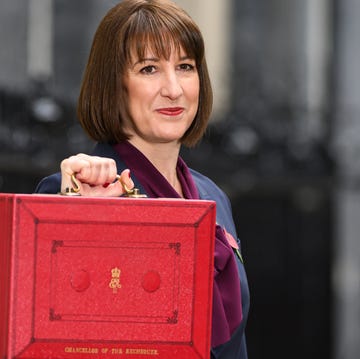Your home is likely to be the most expensive purchase you ever make, and the vast majority of us will use a mortgage to buy it, paying off the loan over many years.
Thanks to the large sum borrowed and the length of the loan - 25 years is the typical time for a repayment mortgage - you can expect to pay as much as half to three-quarters of the price of the house again in interest on top of the original loan, assuming average interest rates of 5%.
This means that if you bought a house for £282,000 - the UK national average in 2024 - with a 5% fixed-rate mortgage and a 10% deposit (meaning you borrow £253,800) you will pay a total of £445,107 back to the bank, of which £191,307 will be pure interest.
If you can afford to pay an amount which is more than the minimum monthly repayments required by your lender, it could really make a big difference. Overpaying your mortgage means you pay less interest in the future and pay off your mortgage sooner, which could save you a lot of money.
What are mortgage overpayments?
Overpaying your mortgage can dramatically cut the amount of interest you end up paying by reducing the outstanding mortgage balance and the length of the mortgage.
Overpayments could take two different forms: a one-off lump sum, such as an inheritance, a pension withdrawal or a bond maturing, or a regular overpayment, for example rounding up your monthly repayment figure by £50.
Depending on the amounts involved, your lender might decide to keep your monthly repayment amount the same, while reducing the term of your loan, or they could reduce the monthly payment amount. Keeping the monthly repayment amount the same even though the outstanding mortgage amount is less than it was, means you will finish paying off the mortgage quicker, saving you thousands in interest.
Should you overpay your mortgage?
Even £50 a month overpayment can make a significant impact on the interest you’ll pay over the lifetime of the mortgage and shorten the mortgage term. And the higher the mortgage interest rate you are on, the bigger the saving with an overpayment.
"If your mortgage debt was £200,000 over 25 years at a 5% interest rate, you would repay around £1,170 per month," says Ben Thompson, deputy CEO at Mortgage Advice Bureau. "If a lump sum of £10,000 was overpaid as a one-off payment, the estimated amount that you would save in interest alone would be £22,780. This means that you would have cleared your debt two years and four months earlier than you would if you had not overpaid," he says.
If, in the same scenario, instead of paying the £10,000 lump sum but instead you overpaid by an extra £50 a month, you could save £13,430 in interest alone and clear the debt one year and 11 months earlier than expected.
What are the limits on mortgage overpayments?
Most lenders will only allow you to overpay 10 per cent of the mortgage balance each year, so make sure you find out what overpayment rules apply to your mortgage and don't risk going over the limit and having to pay a fee. Banks need to plan their lending commitments, so you can't just pay off a contracted loan on a whim, even if you had the extra cash available. But making a 10 per cent overpayment each year if you could afford to do so would result in a huge savings over the life of your home loan.
What's the alternative to overpaying the mortgage?
If you have extra cash to stash, it's worth taking a more holistic look at the state of your finances to check whether this is the best way to deploy your money. Should you up your pension contributions instead or boost your savings? Which will leave you better off in the long run? There’s peace of mind to be had from knowing you have a big enough pension pot saved to allow for a comfortable retirement, while keeping funds in your emergency savings pot is also a top priority, but financially you might be better off reducing your mortgage and saving thousands of pounds in interest.
“Those consumers curious as to whether overpaying their mortgage is the best course of action would be wise to seek some independent financial advice in the first instance,” says Rachel Springall, finance expert, Moneyfacts. “Due to rising interest rates, some may be better off overpaying their mortgage if they want to reduce the term of their loan, but for others with a small debt, it could be more beneficial to boost their pension, or indeed, prioritise their savings.”
“Choosing between overpaying a mortgage, saving cash, or putting money towards a pension really does come down to individual circumstances," says Ben Thompson.
“For many of us, our mortgage payment is our largest monthly outgoing, so the chance to reduce this and pay less in terms of interest is an attractive one. However, most lenders will typically only allow you to repay 10% of the remaining balance a year. If you are thinking of overpaying, it’s imperative that you find out what the limits on overpayments for your mortgage are, as you may be subject to early repayment charges if these are exceeded.”
Mortgage v savings
With rates on savings accounts and ISAs more appealing than they have been in years, your spare cash could be earning 5-7% (depending on the type of account). The key rule, according to personal finance guru Martin Lewis is: if your mortgage rate is around the same, or higher than your savings rate, then it makes sense to overpay.
But you will also need to consider whether you plan to make a one-off payment or regular monthly overpayments, how much you still have to pay off, over what period, and whether you pay tax on savings interest. The Money Saving Expert mortgage overpayment calculator can help with the maths.
Make sure you have enough money in an easy access rainy day fund before putting it into your mortgage, as you won't be able to get that money back. And if you have expensive debts – such as credit cards or loans – it’s important to clear these first.
Mortgage v pension
Should you use any extra cash to pay down the mortgage or boost your pension? There’s no one size fits all answer. Interactive Investor recently compared someone with a £200,000 mortgage with a term of 25 years, who paid £200 extra per month into their pension for 25 years (which would grow to £250 after tax relief), to someone who paid £200 extra per month off their mortgage, clearing their mortgage early. They then diverted the mortgage payments plus the extra £200 into their pension until they reached 25 years in total. (For simplicity, interest rates were kept the same).
The broad conclusion was that, if interest rates were higher than investment rates, then it made sense to overpay your mortgage first and then your pension afterwards, while if investment rates were higher than interest rates, then the reverse was true.
Said Craig Rickman, Personal Finance and Pensions Expert, interactive investor: "The recent falls in mortgage rates may shift the dynamics of the overpaying mortgage vs topping up pensions debate.
"There is, of course, an obvious appeal to reducing your mortgage. Becoming debt-free is a core milestone for many of us and often represent a giant leap towards the holy grail of financial freedom. You’ll also save on interest payments over the life of the loan, which could amount to thousands of pounds. You do, however, need to be wary of any early repayment charges imposed by your lender.
"The arguments for using spare cash to boost your pension are equally strong – and in many cases even stronger. Not only is there the prospect of healthy investment returns over the long term, but pensions also come with attractive upfront tax advantages."
If you have extra cash spare to invest, you’ll have a difficult decision to make, according to Alice Guy, head of pensions and savings, interactive investor, as to whether you use the extra cash to pay off your mortgage more quickly or boost your pension savings instead. "Ideally, if you can afford it, it’s best to do both. Without a crystal ball, it’s difficult to say which is a better option as the outcome largely depends on the level of interest rates and stock market performance.
"Broadly speaking, if the stock market grows more than mortgage interest rates, then you could be better off concentrating on boosting your pension saving,” says Alice. “Whereas, if mortgage interest rates outstrip investment performance, you might benefit more from paying off your mortgage first and then concentrating on boosting your pension. If mortgage rates and investment performance are the same, then there’s not much in it.”
So, you might decide to prioritise overpaying your mortgage or pension at different times depending on the interest rate. And pension tax relief could make a big difference to your decision. “There’s a risk that someone who pays off their mortgage first and then maxes out their pension contributions could miss out on valuable tax relief if their pension contributions outstrip their taxable earnings,” says Alice.
But, says Craig Rickman: "For those torn between the two, the good news is the decision isn’t binary. You can choose to split any surplus savings or income between reducing your mortgage and boosting your pension."
Mortgage overpayment checklist
- Anyone considering overpaying their mortgage should talk to their lender or mortgage broker to find the best solution.
- Check that there are no penalties from your provider for overpaying, and if there are any limits on the amount you can overpay. Most fixed-rate mortgages and some tracker mortgages have an annual overpayment limit of 10% of your total outstanding mortgage balance. But this depends on the lender.
- Check, too, any overpayment you make goes to reduce the debt (so shortening the term) rather than reducing your monthly payments. Sometimes the banks might have an automatic policy on how they deal with overpayments which you can override by discussing directly with the bank.
For example, Barclays Bank says that overpayments higher than three times the usual monthly payment reduce your monthly payment but the loan term stays the same, while overpayments lower than three times the usual monthly payment help pay off your mortgage sooner but your monthly payment stays the same.
The extra payments go into an ‘overpayment balance’, which build up to an amount that can help you pay off your mortgage sooner and can enable you to make underpayments in future. But if you want to use the overpayment balance to reduce your monthly payments, you can discuss it with the bank - but remember, this will not reduce the overall interest by as much as if you continued paying the usual monthly amount.
















